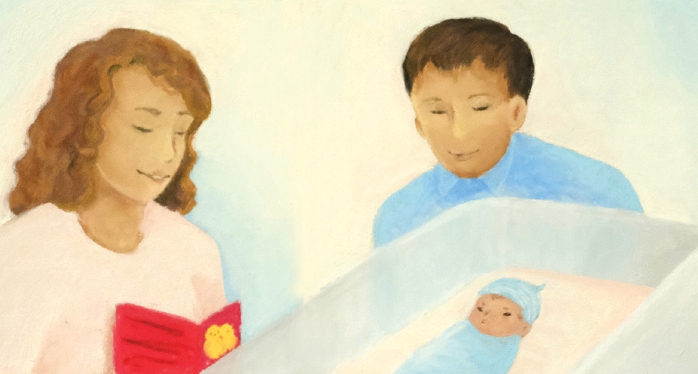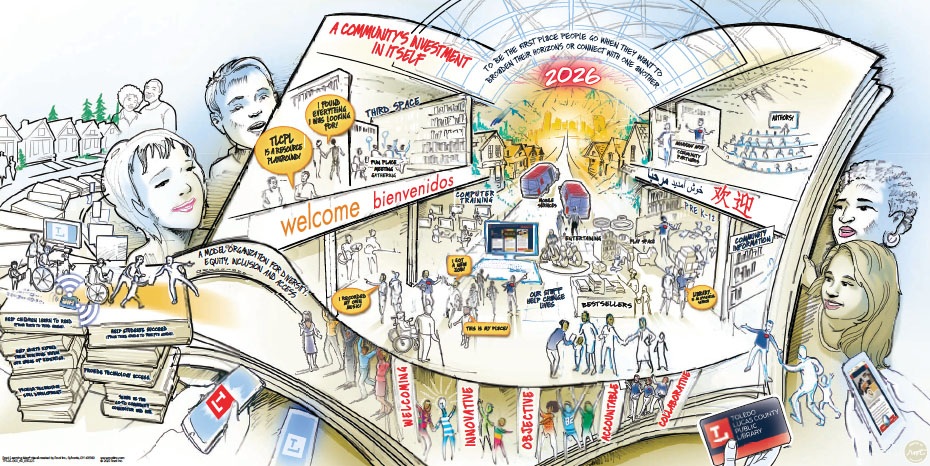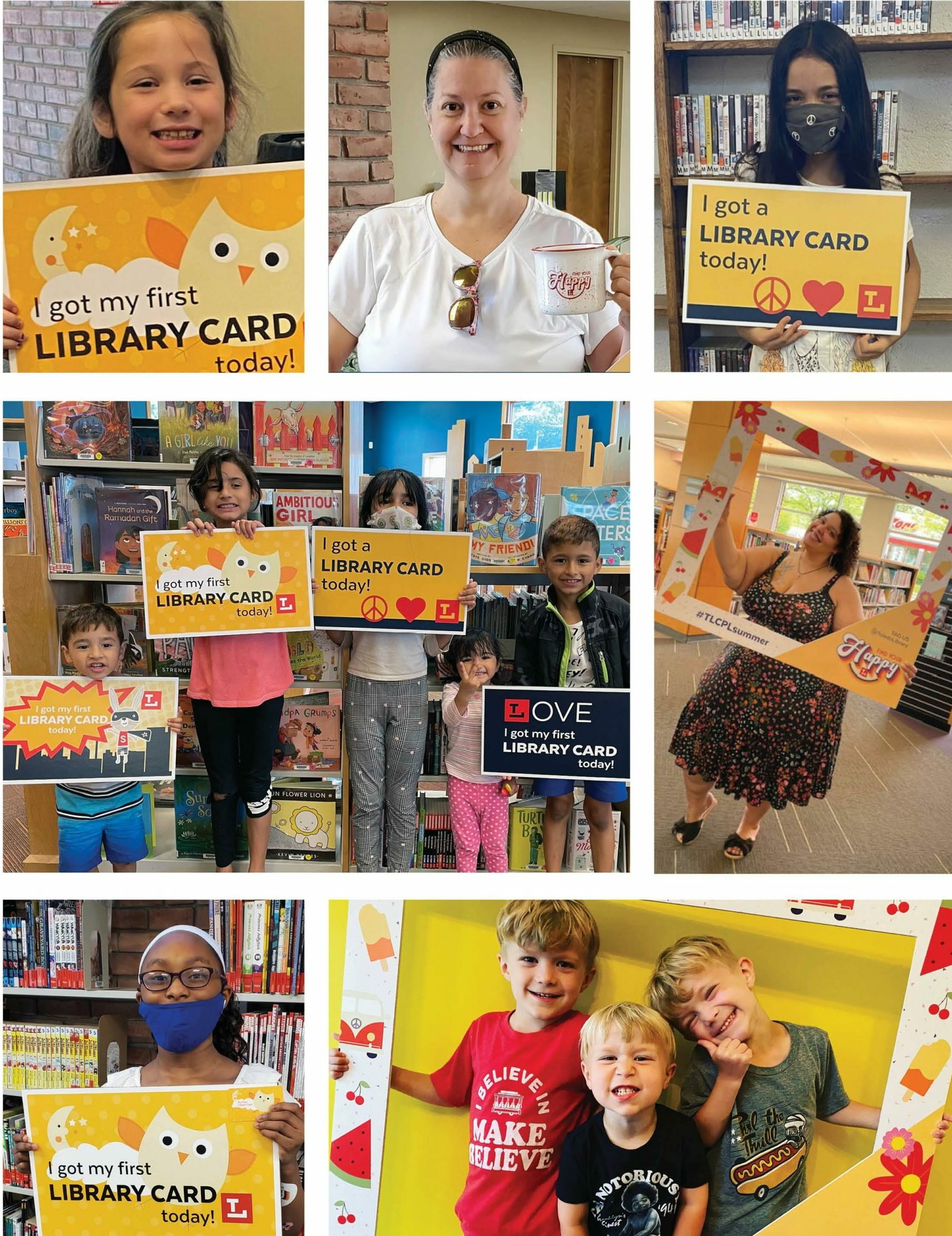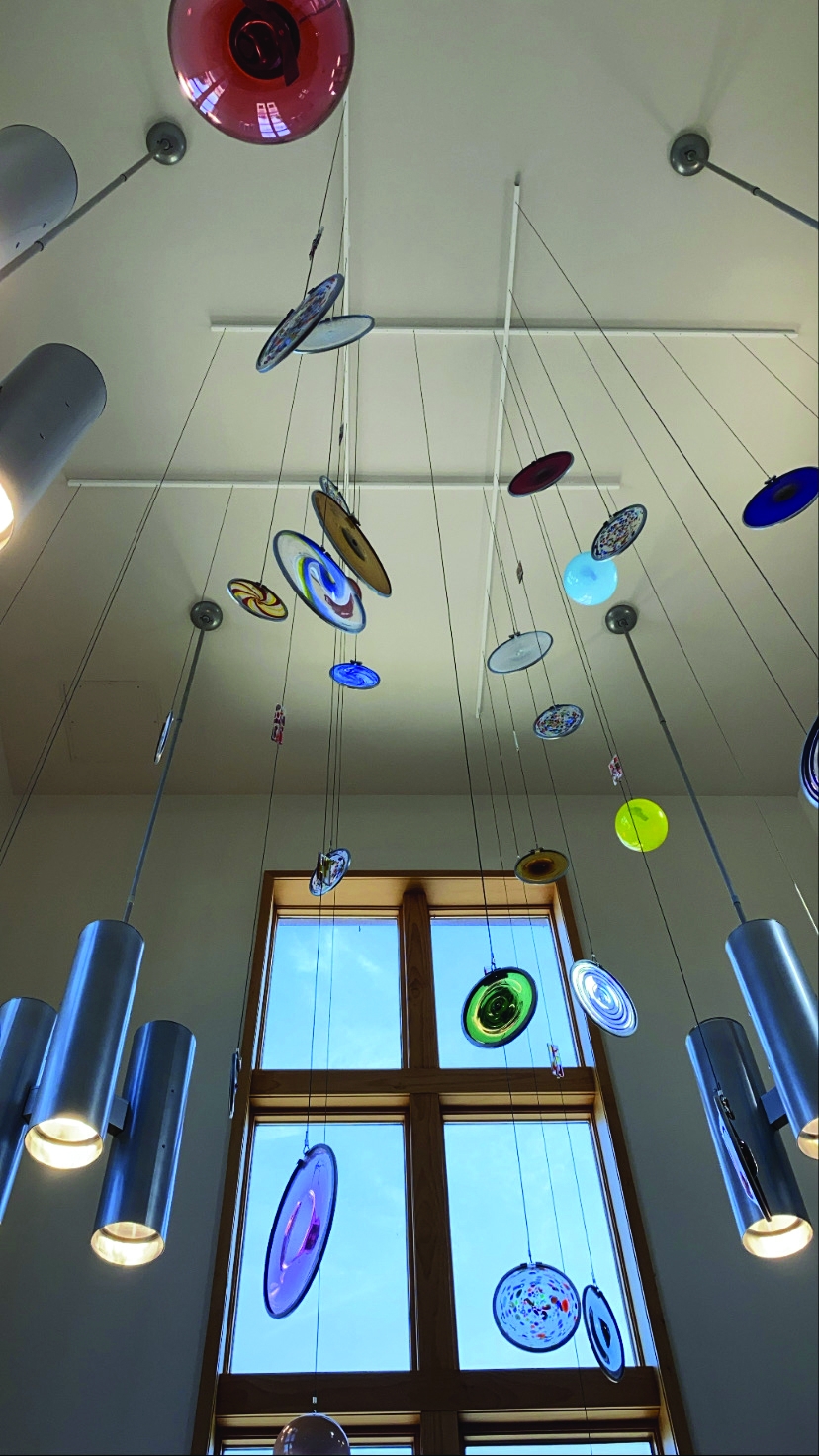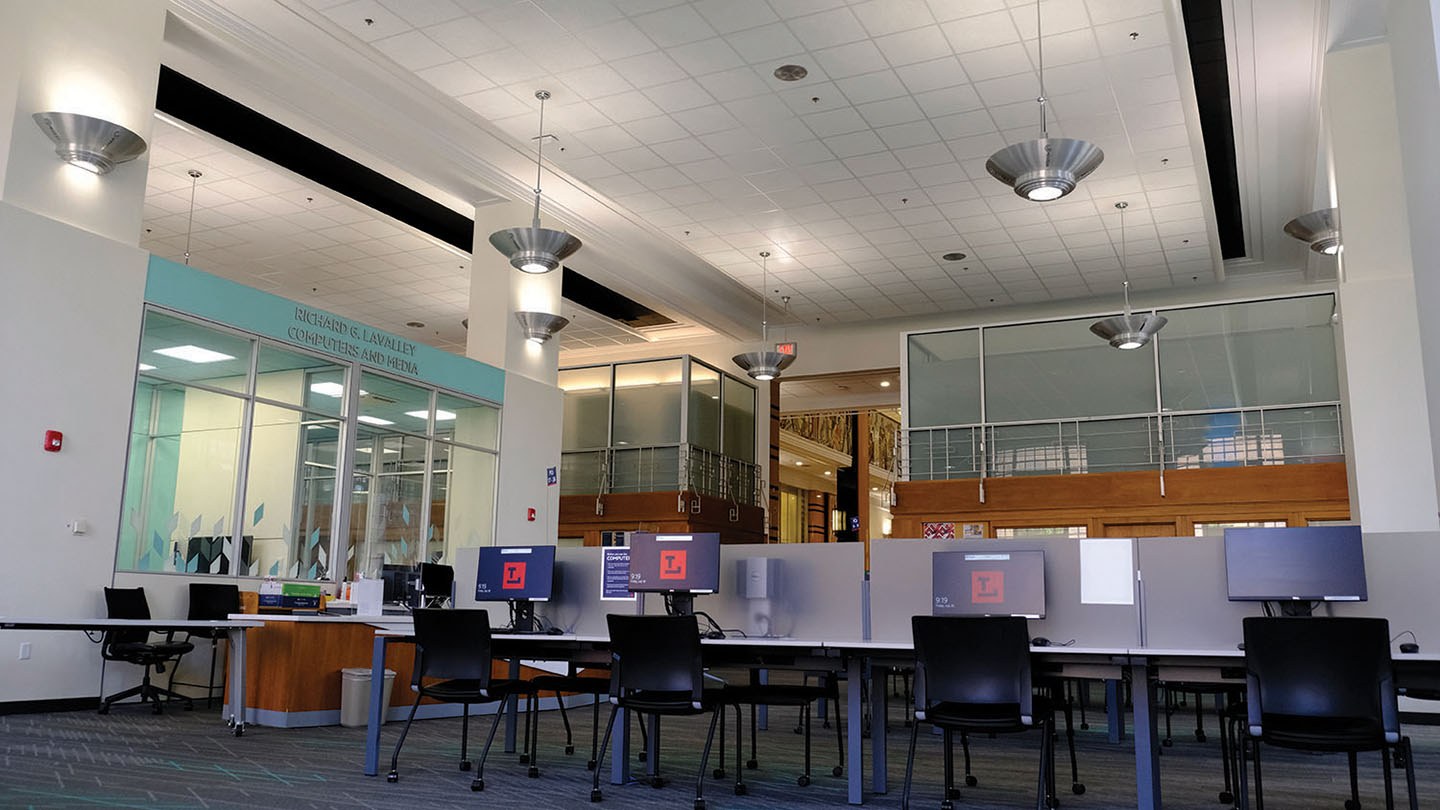Reading to babies in the NICU provides parents with a precious opportunity to bond with their child while also contributing to learning and development.
NEVER TOO EARLY
Reading in the NICU
by ALIA ORRA
At the ProMedica Russell J. Ebeid Children’s Hospital, 72 beds await babies born with challenges that make it too difficult to survive outside the womb unassisted. The Library’s Ready to Read program gives these children and their families a precious avenue for bonding and growth.
The tiniest newborns in the NICU benefit from hearing parents and caregivers read to them
The beeps are a steady soundtrack.
The sounds of machinery supporting life have their own rhythm. In a newborn intensive care unit (NICU), these noises form a familiar backdrop for babies and their parents—a symphonic performance of sorts they had never hoped to hear but must now depend on day and night, as a matter of survival.
Babies in the NICU are born prematurely, often needing oxygen support and unable to take a bottle, receiving food intravenously instead. They are born so small they often cannot be held for a certain amount of time after the delivery; other times they have complicating conditions that make it impossible to live outside a hospital in the early days of their life.
To spend time in a NICU is to accept a new birth story, one that is inherently painful because of its missing and changing pieces. There are no baths to give, no late night feedings, no introductions to grandparents and siblings. There is silence, and waiting, and the sounds of those machines.
“ She knows parents are acutely feeling the limitations on their ability to touch, care, and feed. That is why she is thankful when she sees the small pile of books appear on the windowsills of their rooms. “
The weight of these absences is often on Shona Christy’s mind. She treks through the halls of the ProMedica Russell J. Ebeid Children’s Hospital NICU—where sometimes all 72 of its beds are full with newborns from around northwest Ohio and southeast Michigan—carefully and consciously. As a child life specialist, she knows parents are acutely feeling the limitations on their ability to touch, care, and feed. That is why she is thankful when she sees the small pile of books appear on the windowsills of their rooms.
Those books are a sign the parents have spent time with a librarian, who has given them the one remaining avenue to bond with and nurture their babies: their voice.
This partnership between the Toledo Lucas County Public Library’s Ready to Read program and the Ebeid Children’s NICU parent group, started several years ago, teaches parents the importance of reading to their newborn babies and provides them the tools—free books and guidance—without asking them to leave the hospital. It is the restoration of a parenting act—one that feels constructive and strengthening—through simply reading a story.
“Parents are often afraid. Their babies are so little and so fragile and they don’t want to do the wrong thing,” Christy said. “Having someone say this is not only good for your baby, we encourage you to do it and here are the tools to do it, it’s just one less thing that parents have to worry about and one thing they can look forward to.”
The Library’s Ready to Read specialists provide free books and guidance to help parents and caregivers learn how important it is to talk, read, sing, write, and play with children from birth.
The impact of reading books to babies was not always understood.
Though storytimes have long been a part of the Library’s history, according to the Library’s Youth Services Coordinator Nancy Eames, they were at first geared toward children who were school age. The first storytime sessions she conducted, as a new librarian in the late 1980s, didn’t include babies in the audience.
Understandings of literacy have evolved and show that to help children effectively build a vocabulary that will support them as readers, it’s important to read to them from the very beginning of their lives.
“The storytimes we did back in the late ‘80s look nothing like storytime today,” Eames said. Now, rather than encourage strict silence, librarians ask questions and take the story apart with their audience, asking them to make predictions. Parents are encouraged to stay in the room. And most importantly, storytime and early literacy tools are taken out into the community, to health departments, doctor’s waiting rooms, family courts, the NICU, and other places where librarians can serve families where they are.
This work is needed to address literacy challenges in Lucas County—about two thirds of children in the area are not ready for kindergarten, according to Ohio’s Kindergarten Readiness Assessment—a significant portion of the community’s kids. This fact spurred the creation of the Library’s Ready to Read program in 2014, originally funded by the Library Legacy Foundation and now supported by the Library’s taxpayer-funded budget. (Some support from an endowment remains, used to purchase books for reading kits that are offered to families for free.)
The program taught children’s librarians to train families, teaching them the importance of talking, reading, singing, writing, and playing with children with intentionality. Together, these activities are the building blocks that develop a child’s context and vocabulary.
“ Talking about kindergarten readiness, about normal things, not just medical things and medical procedures, creates a sense of normalcy. “
“If you never heard of a carrot before, and you saw the word in print, you would think it said car rot,” Eames said. “These five activities build children’s knowledge about the world which, in turn, helps them become more capable readers later on.”
When librarians meet with the NICU parent group about once per month, this is the type of information they pass on: how the sound of a parent’s voice simply reading a story can be a genuinely beneficial act to their baby’s learning and development.
For parents John and Alysha Vergowven—on day 85 in the NICU with their twin girls Emma and Claire—the parent group’s connection with the Library’s Read to Read program provided an invaluable resource.
“I started by reading my favorite books, like The Giving Tree,” John said. “Even though my wife and I are both elementary school teachers, we didn’t realize how early you could start. I figured it would take about a year before my babies could understand what I was saying and for the story to have any value. But I learned it’s about hearing our speech and the way speech sounds. That way when they start speaking, they’ll already have the experience of it, they’ll have a model.”
“Those little ones in the NICU, they are at the beginning of a big quest to start learning vocabulary,” said Lauren Boeke, a Ready to Read librarian who often leads the Library’s visits to the NICU. “Many of those newborns are still on a lot of machinery to continue to breathe and eat on their own. Reading is a great way to bond and at the same time begin the years-long process of getting them ready for kindergarten.”
The opportunity to pause to think about the future—kindergarten—in a moment when the present is so consuming is essential for families, according to Kim Folk-Axe, a social worker who provides support in the Ebeid Children’s NICU.
“They may be thinking, ‘My baby now is 1 pound 5 ounces. But someday I’m going to have a baby that can hold a pair of scissors.’ Talking about kindergarten readiness, about normal things, not just medical things and medical procedures, creates a sense of normalcy,” Folk-Axe said. “Getting time to talk about things that other parents get to talk about and things other parents get to do with their children is important. They’re not so lonely anymore.”
“I think that we are one piece of the puzzle, in the classic metaphor of it takes a village to raise a child,” Eames said. “There are many organizations in Lucas County focused on early childhood and early childhood literacy, including the team at the Ebeid Children’s NICU. We’re making a bigger difference collectively.”
The Library’s Ready to Read outreach also includes the Metroparks, the Toledo Zoo, area YMCAs, Franklin Park Mall, and laundromats, and an emerging program with the NICU at Mercy Health. They even ride along and read stories and give literacy education on TARTA buses. While many of these were on hiatus due to the pandemic, their return is important to the growth of the community as a whole. Thankfully, the Ready to Read team has been able to provide the NICU and others one-to-one instruction via Zoom during the pandemic.
“There’s a lot of research that shows that investing in early childhood has really good economic returns for a community,” Eames said. “When we make sure that our children are ready for school and ready to learn to read, that early investment pays off. Those kids are going to graduate from high school, they’re going to go on to work and be productive members of our community. Kids who struggle in school are more likely to drop out. These early investments have a long-term impact on the health and well-being of everybody in Lucas County.”
It’s never too early (or late) to get children ready to learn to read. Above, Grandfather Larry Cogan reads a selection of Ready to Read books to Theo. The Library trains more than 1,100 families in a year and provides them with appropriate early literacy materials based on the ages of their children.
How Ready Are Our Kids?
According to Ohio’s Kindergarten Readiness Assessment of Lucas County:
- 1/3 of children are READY FOR KINDERGARTEN.
- 1/3 of children are APPROACHING READINESS.
- 1/3 of children NEED INTENSIVE INTERVENTION TO SUCCEED.
The Library’s Ready to Read program was built in part to address the needs of students struggling with kindergarten readiness in Lucas County.
“We develop programming with an eye toward accessibility,” said Ready to Read Specialist Cristin Brown. “We’re out in the community trying to reach those families and caregivers who aren’t able to come to us but whose children need that support.”

